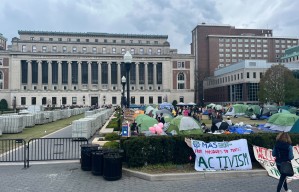Natural habitats along coastlines could protect millions of people's property and safety.
A recent study found neglecting ecosystems could double the damage caused by coastal storms to those at "high-hazard" risk, a Natural Capital Project press release reported.
Approxiamtely 16 percent of America's shoreline is considered to be "high-risk." About 1.3 million people with $300 billion worth of property live in these regions.
Sixty-seven percent of the coastline is protected by natural ecosystems. If these habitats are neglected the amount of people living in high-risk areas, including the poor and elderly, could double.
The areas that are most heavily protected by natural habitats can be found in California, New York, and Florida.
"The natural environment is plays a key role in protecting our nation's coasts," Katie Arkema, lead author of the study and a Stanford University scientist who worked on the project, said. "If we lose these defenses, we will either have to have massive investments in engineered defenses or risk greater damage to millions of people and billions in property."
The study created the first complete map of the U.S. coastline that identifies how much protection we get "from sand dunes to oyster and coral reefs to sea grasses, mangroves and more."
The map aims to point out where improvements would be most beneficial in protecting the coast from rising sea-levels.
The Obama Administration's Climate Action Plan, released June 25, outlines a new initiative to protect America's coastline naturally. The project hopes to show them where to focus their interest.
"Hardening our shorelines with sea walls and other costly engineering shouldn't be the default solution. This study helps us identify those places and opportunities we have to keep nature protecting our coastal communities - and giving us all the other benefits it can provide, such as recreation, fish nurseries, water filtration and erosion control," Peter Kareiva, co-author of the study and chief scientist at The Nature Conservancy, said.








